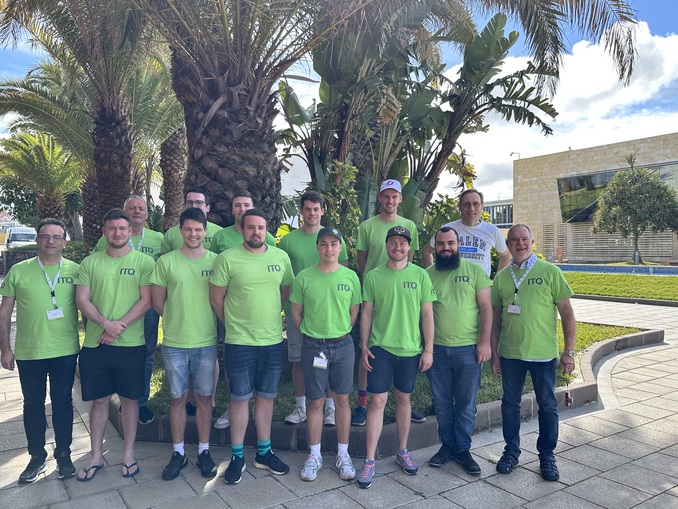Sun, beach and prototypingAalen students at the Smart Green Island Makeathon in Las Palmas de Gran Canaria
Mechatronics students and professors from Aalen University took part in the sixth Makeathon at Gran Canaria. Aalen University of Applied Sciences has been involved since 2016 and this year was represented by four professors and ten students from the courses Mechatronics, Mechatronics compact through crediting (MekA) and Master Mechatronics / Systems Engineering and Computer Science. Divided into three groups, the students worked in international teams with people from other universities and colleges. More than 206 students from 29 universities and colleges in 23 countries took part. The various tasks were worked on in 25 teams. The teams from ITQ and the main sponsors were supported in the creative implementation of the ideas. Companies such as Murrlelektronic, B&R, Igus, Beckhoff, Vishay, Lorenz and MathWorks support the participants with technical support and hardware.
Team "Flying Fish"
The team consisted of 21 people: 6 Spaniards, 1 Austrian and 16 people from Germany - including two students from Aalen University. The challenge was supported by sponsor Vishay Intertechnology, Inc. The team built a self-sustaining buoy that measures plastic pollution in the ocean. In order to make this valuable data usable, a drone was developed with the team from the Aachen Drone Development Initiative e.V., which searches for the buoy and transmits the data to the mainland.
Team "Enginerds" and Team "Waterin. Smart."
Five students from Aalen University worked on the Eginerds team. The team was supplemented by three students from Spain. Three students from Aalen University, one student from India, four from Gran Canaria and five other students from Germany formed the team "Waterin. Smart.".
The teams “Waterin. Smart.” and “Enginerds” had dealt with the task of the sponsor Lorenz. The challenge was to develop a system for an irrigation trolley with an operator for watering individual plants, which is supported by intelligent control of the amount of water to be distributed. Input data are plant identification, geodata, soil moisture, temperature, weather data taking into account individual needs (plant type, soil type, growth plan, etc.). A water meter with a pulse output serves as a feedback sensor for the amount of water used.
In the end, not only the teams were satisfied with their results, but also the sponsors and supervisors. Professor Bernhard Höfig summarized: “The Smart Green Island Makeathon was again a special highlight this semester. It is always exciting to see how creatively and enthusiastically the international teams work to solve the tasks. Everyone contributes their ideas and skills and after four days a working prototype is presented.”

